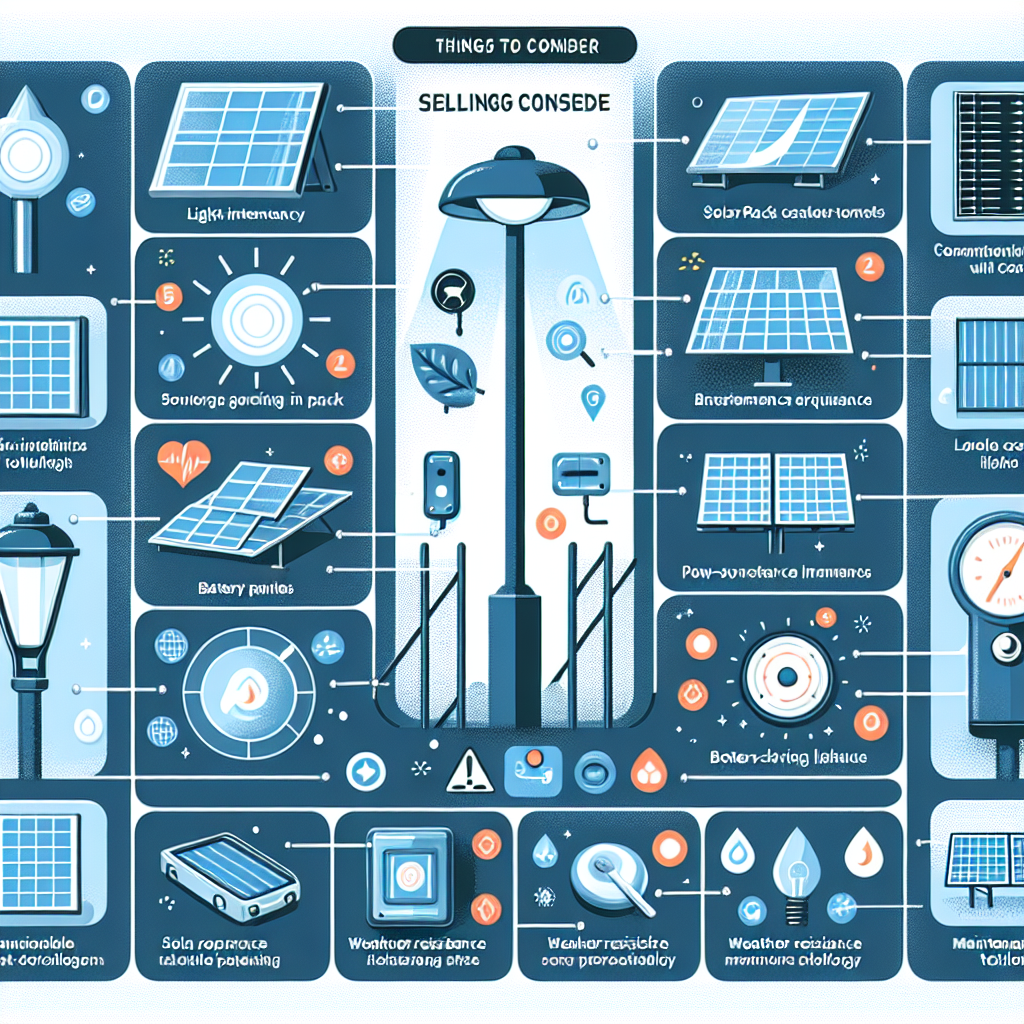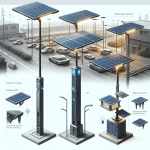Factors to Consider when Choosing Solar Carpark Lights
-
Table of Contents
When selecting solar carpark lights, several critical factors must be considered to ensure optimal performance, efficiency, and longevity. These factors include the location and climate, which influence the amount of sunlight available for charging; the brightness and coverage area required to ensure adequate illumination and safety; the battery capacity and type, which determine how long the lights can operate during periods of low sunlight; the durability and weather resistance of the materials, essential for withstanding various environmental conditions; the ease of installation and maintenance, which affects long-term operational costs; and the overall cost, including initial investment and potential savings on energy bills. By carefully evaluating these factors, one can make an informed decision that balances functionality, cost-effectiveness, and sustainability.
Durability And Weather Resistance
When selecting solar carpark lights, durability and weather resistance are paramount considerations that significantly impact the longevity and performance of the lighting system. These factors ensure that the lights can withstand various environmental conditions and continue to function effectively over time. To begin with, the materials used in the construction of solar carpark lights play a crucial role in their durability. High-quality materials such as stainless steel, aluminum, and polycarbonate are often preferred due to their resistance to corrosion and physical damage. Stainless steel, for instance, offers excellent resistance to rust and can endure harsh weather conditions, making it an ideal choice for outdoor applications. Similarly, aluminum is lightweight yet robust, providing a good balance between strength and ease of installation. Polycarbonate, known for its impact resistance, ensures that the lights can withstand accidental knocks and vandalism.
In addition to material selection, the design of the solar carpark lights also contributes to their durability. A well-engineered design that incorporates features such as reinforced housings and protective coatings can enhance the lights’ ability to resist wear and tear. For example, lights with a powder-coated finish are less likely to suffer from scratches and fading, thereby maintaining their aesthetic appeal and functionality over time. Furthermore, the integration of tamper-proof components can deter vandalism and unauthorized access, ensuring the lights remain operational and secure.
Weather resistance is another critical factor to consider when choosing solar carpark lights. These lights are exposed to various weather conditions, including rain, snow, wind, and extreme temperatures. Therefore, it is essential to select lights that are designed to withstand these elements. One way to assess the weather resistance of solar carpark lights is by checking their Ingress Protection (IP) rating. The IP rating indicates the level of protection the lights have against dust and water ingress. For outdoor applications, a minimum IP65 rating is recommended, as it ensures the lights are dust-tight and can withstand low-pressure water jets from any direction.
Moreover, the ability of solar carpark lights to operate efficiently in different temperature ranges is crucial. Lights equipped with high-quality batteries and solar panels are more likely to perform well in both hot and cold climates. Lithium-ion batteries, for example, are known for their excellent temperature tolerance and long lifespan, making them a suitable choice for solar carpark lights. Additionally, solar panels with high efficiency can capture and convert sunlight into energy even in low-light conditions, ensuring consistent performance throughout the year.
Another aspect to consider is the maintenance requirements of the solar carpark lights. Durable and weather-resistant lights typically require less frequent maintenance, reducing the overall cost and effort involved in keeping them operational. Features such as self-cleaning solar panels and automated lighting controls can further minimize maintenance needs, ensuring the lights remain functional with minimal intervention.
In conclusion, when choosing solar carpark lights, it is essential to prioritize durability and weather resistance to ensure long-term performance and reliability. By selecting lights made from high-quality materials, with robust designs and appropriate IP ratings, one can ensure that the lighting system will withstand various environmental conditions and continue to provide effective illumination. Additionally, considering factors such as temperature tolerance, battery quality, and maintenance requirements can further enhance the overall durability and weather resistance of the solar carpark lights, making them a valuable investment for any outdoor parking area.
Energy Efficiency And Battery Life

When selecting solar carpark lights, energy efficiency and battery life are paramount considerations that significantly impact the overall performance and sustainability of the lighting system. Energy efficiency in solar carpark lights is primarily determined by the quality of the photovoltaic panels and the efficiency of the light-emitting diodes (LEDs) used. High-quality photovoltaic panels are essential as they convert sunlight into electrical energy with minimal losses. Consequently, choosing panels with a high conversion efficiency ensures that the maximum amount of solar energy is harnessed, thereby reducing the need for oversized panels and minimizing installation costs.
In addition to the photovoltaic panels, the efficiency of the LEDs plays a crucial role in determining the overall energy consumption of the solar carpark lights. LEDs are preferred over traditional lighting options due to their superior energy efficiency and longer lifespan. When selecting LEDs, it is important to consider their luminous efficacy, which is a measure of how well a light source produces visible light. Higher luminous efficacy means that more light is produced per unit of energy consumed, leading to lower energy usage and extended battery life.
Battery life is another critical factor that must be carefully evaluated when choosing solar carpark lights. The battery serves as the energy storage component, ensuring that the lights remain operational during periods of low sunlight or at night. The type of battery used, its capacity, and its cycle life are key aspects that influence the reliability and longevity of the solar lighting system. Lithium-ion batteries are commonly used in solar carpark lights due to their high energy density, long cycle life, and low maintenance requirements. These batteries can store a significant amount of energy in a compact form, making them ideal for applications where space is limited.
Moreover, the capacity of the battery should be sufficient to power the lights for an extended period, even during consecutive cloudy days. This ensures that the carpark remains well-lit and secure, regardless of weather conditions. It is also important to consider the depth of discharge (DoD) of the battery, which indicates the percentage of the battery’s capacity that can be used without significantly shortening its lifespan. Batteries with a higher DoD can provide more usable energy, enhancing the overall efficiency of the solar carpark lights.
Furthermore, the integration of smart energy management systems can optimize the performance of solar carpark lights by regulating energy consumption and extending battery life. These systems can adjust the brightness of the lights based on the time of day, occupancy, and ambient light levels, ensuring that energy is used efficiently and only when necessary. This not only conserves battery power but also reduces light pollution and enhances the overall user experience.
In conclusion, when choosing solar carpark lights, it is essential to prioritize energy efficiency and battery life to ensure a reliable, cost-effective, and sustainable lighting solution. By selecting high-quality photovoltaic panels, efficient LEDs, and robust batteries, and by incorporating smart energy management systems, one can achieve optimal performance and longevity for solar carpark lights. These considerations not only contribute to environmental sustainability but also provide significant economic benefits through reduced energy costs and maintenance requirements.
Installation And Maintenance Requirements
When selecting solar carpark lights, it is crucial to consider the installation and maintenance requirements to ensure optimal performance and longevity. The installation process of solar carpark lights is generally less complex than traditional lighting systems, as it does not require extensive wiring or connection to the electrical grid. However, it is essential to evaluate the specific site conditions and the design of the lighting system to ensure a seamless installation. Factors such as the geographical location, the amount of sunlight the area receives, and the layout of the carpark must be taken into account. These elements influence the positioning of the solar panels and the overall efficiency of the lighting system.
Moreover, the structural integrity of the mounting poles and fixtures is paramount. The poles must be robust enough to withstand environmental conditions such as wind, rain, and potential vandalism. It is advisable to use corrosion-resistant materials to enhance durability. Additionally, the height and spacing of the poles should be carefully planned to provide uniform illumination across the carpark, thereby enhancing safety and security.
Transitioning to the maintenance aspect, solar carpark lights are generally low-maintenance compared to conventional lighting systems. However, regular inspections and upkeep are necessary to ensure they function efficiently. One of the primary maintenance tasks involves cleaning the solar panels. Dust, debris, and bird droppings can accumulate on the panels, reducing their ability to absorb sunlight and generate power. Therefore, periodic cleaning is essential to maintain optimal energy production.
Furthermore, it is important to monitor the battery health of the solar carpark lights. The batteries store the energy generated by the solar panels and power the lights during the night. Over time, batteries can degrade and lose their capacity to hold a charge. Regularly checking the battery status and replacing them when necessary is crucial to prevent any disruption in lighting. Additionally, using high-quality batteries with a longer lifespan can reduce the frequency of replacements and lower maintenance costs.
Another critical aspect of maintenance is ensuring the proper functioning of the light fixtures and control systems. LED bulbs, commonly used in solar carpark lights, have a long lifespan but may still require occasional replacement. It is also important to check the control systems that manage the lighting schedules and intensity. These systems should be calibrated correctly to ensure the lights operate efficiently and provide adequate illumination during peak hours.
In addition to these routine maintenance tasks, it is beneficial to have a contingency plan in place for unexpected issues such as severe weather conditions or technical malfunctions. Having a reliable support system or service provider can expedite repairs and minimize downtime, ensuring the carpark remains well-lit and secure.
In conclusion, while solar carpark lights offer numerous advantages, including energy efficiency and reduced environmental impact, careful consideration of installation and maintenance requirements is essential. By thoroughly evaluating site conditions, ensuring robust installation, and implementing regular maintenance practices, one can maximize the performance and longevity of solar carpark lights. This approach not only enhances the safety and security of the carpark but also contributes to sustainable and cost-effective lighting solutions.
┬Ā
Read more about Solar Carpark Lights:
- Introduction to Solar Carpark Lights
- Types of Solar Carpark Lights
- Installation and Maintenance of Solar Carpark Lights
- Top Brands in the Solar Carpark Light Industry
- Innovative Features of Solar Carpark Lights
- Case Studies: Successful Implementation of Solar Carpark Lights
- Practical Applications of Solar Carpark Lights
- Future Developments in Solar Carpark Lights
- Frequently Asked Questions about Solar Carpark Lights









